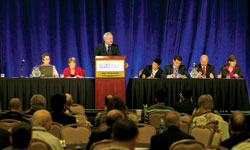SCOTUS victories elate 25th LGBT bar conference

Photo by Norbert Von Der Groeben
“This has been one of the best years ever.”
Attorney Shannon Minter’s enthusiasm summed up the mood rippling through the 25th annual gathering at the Lavender Law Conference in San Francisco in late August.
As legal director of the National Center for Lesbian Rights, Minter served as lead counsel for the plaintiffs in California’s 2008 marriage equality case, In re Marriage Cases, which allowed same-sex couples to marry in the state. The U.S. Supreme Court’s decision in Hollingsworth v. Perry this year cleared the way for those marriages to resume after a voter initiative had halted them.
Minter looks ahead to the next three or four years as the critical window for winning marriage equality in enough states legislatively or through initiatives to carry the momentum through to nationwide recognition in the Supreme Court.
“The lead-up to the Supreme Court cases on marriage was very intense,” he says, “but the aftermath has been more intense than anything I have experienced since the original push getting marriage in state courts in the 2000s.”
The high court’s decisions in Perry and U.S. v. Windsor, striking down the Defense of Marriage Act, may have opened the doors to marriage equality and a host of other rights. But marching through the doors will require clarifying more than 1,000 rights and privileges attached to marriage, says D’Arcy Klemnitz, executive director of the National LGBT Bar Association. “I think what we are looking for is a lot of answers to what the future holds,” she says.
From room to room during the three-day conference, lawyers clustered in workshops seeking answers to questions likely to confront practitioners in the immediate aftermath of marriage law changes. The issues go well beyond the short-term implications for the newly married.
How will a legally married same-sex couple divorce if they live in a state that does not recognize their union? Can they adopt? May a survivor inherit? May a gay man inherit from his late common-law husband in one of the six states that still recognizes common-law marriage? And may that relationship even be recognized? Many of these issues are already before state courts.
And marriage equality changes will spill over into immigration rights cases as more U.S. citizens seek to sponsor a same-sex partner for legal immigration, just as opposite-sex couples do now.
TITLE VII TOO
In the past, Minter says, courts were afraid to hold that Title VII of the Civil Rights Act protected gay people in the workplace because of the implications for marriage. “As the marriage bans fall away, I think that barrier will fall away,” he says. “In the next 25 years I think it will be firmly established that Title VII and all discrimination laws protect LGBT people.”
Just last year the Equal Employment Opportunity Commission recognized that Title VII protects transgender people from what amounts to sex discrimination in Macy v. Holder. That action buoyed the conference mood for Houston Municipal Court Judge Phyllis Frye, the first out transgender judge in the U.S. She received a standing ovation as the conference’s opening speaker and has been dubbed the transgender movement’s grandmother.
“I’ve been a big pusher for employment rights,” she says. “The Macy decision is very important to me.”
The festive mood carried beyond the occasional rainbow bow ties and ubiquitous sparkly lavender tote bags to include mainstream courting by big-name law firm sponsors and efforts to attract gay consumers with a fully loaded black BMW convertible parked outside the banquet hall.
But not everyone shared the euphoria. Carrington “Rusty” Mead is a sole practitioner who works on LGBT legal rights for low-income people in Jacksonville, Fla. The campaign for same-sex marriage across the U.S. has been “a bit dismissive” of what she calls the “more immediate oppression” in places like Florida.
“We’re still living Stonewall,” a reference to the 1969 confrontations with police outside the Stonewall Inn bar in New York City that marked the beginning of the gay liberation movement.
“They want us to wait,” Mead says. “But while we’re waiting, people are actually dying. That is my reality.”
This article originally appeared in the November 2013 issue of the ABA Journal with this headline: “Happy Anniversary: SCOTUS victories elate 25th LGBT bar conference.”



